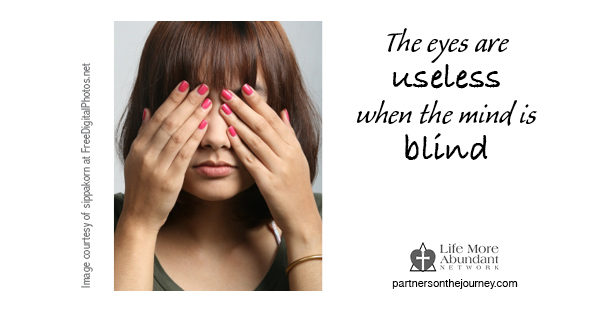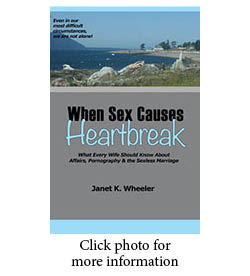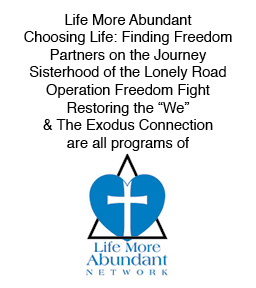We all have a thinking problem. Even those of us who feel we have an open mind, have trouble seeing things as they really are.
The phenomenon that so often gets in the way of our being able to see the truth is called confirmation bias.
It’s our natural tendency to look for data that supports our pre-existing beliefs or theories. Subconsciously, we “sort” through information, embracing points that appear to confirm our beliefs and dismissing those that don’t.
It Changed MY Ability to See Clearly
My first husband unexpectedly moved out when our children were very, very young. I was, of course, devastated. I didn’t even believe in divorce and yet it very quickly became evident to me that that was exactly where we were heading. There seemed to be nothing I could do to stop the fast-moving train I had been forced to board.
I remember, as a newly separated adult, going to church and feeling emotionally lambasted by the awareness that everywhere I looked there were couples—something I had never noticed as married person.
The loneliness, awkwardness and embarrassment of sitting alone in church planted the seed that “I am the odd one here. I am different than everyone else. I don’t fit in.”
After that, anything that seemed to support that idea was magnified in my eyes. Even worse, anything that had the potential to prove my thinking wrong faded from my view.
I became blind to the fact that there were plenty of other single people at church. I was unable to acknowledge that there were even some that had, sadly, experienced exactly what I was going through. There was no way that I could even fathom that I could still hold my head up, be accepted and enjoy fellowship with the body of Christ. I just felt damaged and unlovable. Almost daily I was gathering more “proof” to support this belief.
It took the grace of God, and a very long time, for me to become free of this inaccurate thinking bias. Only then was I finally able to see the truth.
It Makes Sense
Becoming aware of the human bent toward selective thinking helps explain a lot of things:
- 1. How two people can be exposed to the exact same scenario and, yet, draw very different conclusions about what occurred.
2. Why we may only be able to remember the parts of a conversation that align with what we believe.
3. Our natural gravitation toward people and situations that share our beliefs and our discounting or avoidance of those who don’t.
4. How someone can hold onto a perception long after the evidence for it has been shown to be false.
5. Why people can interpret totally ambiguous information as fully supporting their point.
Where Have You Seen This Lately?
Yep! Biased thinking is particularly prevalent in today’s political arena.
Individuals have, over the past months, formulated opinions about the key players. They’ve heard things, seen things, and their fears and emotions have gotten involved. Once that happens the process of those opinions becoming firmly established beliefs escalates and confirmation bias takes over.
I’m sure you’ve seen evidence of this in the news and on Facebook. Readers are quick to jump on anything that supports their beliefs. Most seem compelled to share or comment on the “proof” they’ve found.
No matter how many others refute their conclusions, they are only able to accept the comments and thoughts that align with their beliefs. This remains true even when something has been proven inaccurate over and over again.
People holding opposing beliefs scratch their heads and wonder why these folks are unable to let things go—especially when, in their mind, their statements have been proven false.
Grace and civility go out the window and disrespect and name calling ensue. People often wonder, out loud, whether these people are just insanely stupid.
In actuality, they aren’t stupid at all They are just the victims of severe confirmation bias.
People Can’t Easily See Beyond their Belief Systems
We all struggle with confirmation bias on some level. It is the thing that keeps our belief system intact.
Unfortunately, we live in a fallen world with fallen beliefs. A lot of what we have come to believe is not actually true. But true, or not, those beliefs become the rules we live by. If they are erroneous, they will naturally have a damaging effect on our daily lives.
When confirmation bias kicks in to protect something that is not true, it can:
• create an overconfidence in a our personal beliefs that can lead to poor decision making.
• keep us from being able to entertain or accept contrary evidence that might change our erroneous beliefs to true ones
• effect our relationships and our ability to work together to find solutions
• create fear which causes automatic emotional reactions that further destroy relationships
• cause us to seek relief from the negative consequences and feelings it creates with compulsive activities or substances
Is It Hopeless?
Of course not!
God is fully able to help us align our thinking with HIS and find increasing freedom from confirmation bias.
If we never challenge our belief systems we become stuck in a loop. We are destined to continue to repeat scenarios and get the same results. That is why one of the most crucial elements of both addiction recovery and personal growth involve letting God rewrite our long held beliefs.
We’ll be talking more about how to do that in future blog posts, but an important first step is simply becoming aware of what you believe. Look for areas of black and white thinking, vows, over-generalizing (saying things about yourself or others that include words like “always”, “never: or “everyone”), mistaking feelings for facts, and blaming.
That small step will begin to crack open the door to reducing the power and limitations confirmation bias has previously had in your life.
Guide me in your truth and teach me, for you are God my Savior and my hope is in you all day long. — Psalm 25:5
TODAY’S CHAT: Where have you seen examples of confirmation bias in the lives around you? How does the understanding of confirmation bias change the way you think about them (or you?)



Leave A Response